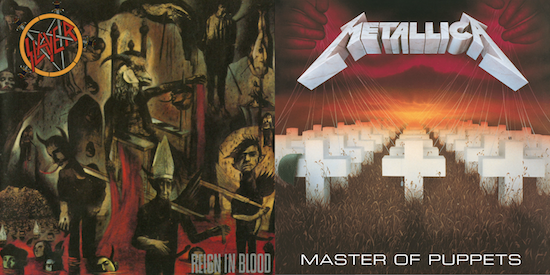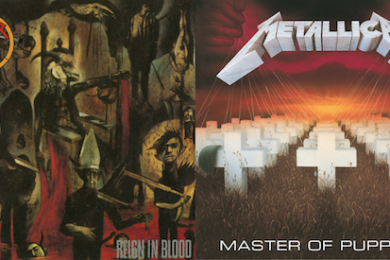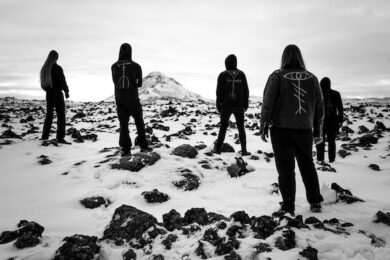Before you read on, we have a favour to ask of you. If you enjoy this feature and are currently OK for money, can you consider sparing us the price of a pint or a couple of cups of fancy coffee. A rise in donations is the only way tQ will survive the current pandemic. Thanks for reading, and best wishes to you and yours.
A mutant virus. A population cowering indoors. Media exercising mind control. The military-industrial complex gently flexing its biceps, waiting to pounce… Are we living in the lyrics of a thrash metal song from 1986?
Puerile, snotty and maddeningly adrenalised, ‘thrash metal’ has been a popular tag for a subgenre of fast heavy metal since at least 1984. Arguments still rage about where it started, with answers ranging from the reasonable (Venom’s first album in 1981) to the unreasonable (Motörhead, Judas Priest, Deep Purple’s ‘Speed King’).
However tQ aren’t paying us by the hour, so let us skip lightly over all that and jump forward to 1986, when the two best thrash albums ever made were released – but which one is the Master? Which one Reigns supreme? In a debate perfectly suited to the long, unproductive hours of lockdown, let’s find out.
[Author’s note: The following rantings are adapted from books that I wrote in 2003 and 2007. The fanboy tone is way over the top and some of the metaphors seem pretty naive now, but what the hell, it’s only rock & roll.]
The case for Metallica’s Master Of Puppets
Pick up a copy of Master Of Puppets on vinyl – ideally, the 45rpm double LP version – and you’ll notice a sticker on the cover, reading "The only track you probably won’t want to play is ‘Damage, Inc.’ due to the multiple use of the infamous ‘F’ word. Otherwise, there aren’t any ‘Shits’, ‘Fucks’, ‘Pisses’, ‘Cunts’, ‘Motherfuckers’, or ‘Cocksuckers’ anywhere on this record."
This was a strangely childish choice, given the maturity of the songs. Fortunately, there’s nothing remotely juvenile about the music on the album, which is written, arranged, engineered, performed and recorded to the highest possible standards. You may recall what it felt like to hear the introduction of the first song, ‘Battery’, for the first time. Its acoustic introduction and the monstrous wall of riffs that follows it are unforgettable. The layers of guitar harmonies are both classically delicate and epic in ambition; the sound of ‘Battery’ is one of a supremely talented group playing in unison.
The same is also true of the album’s title track, in which the then 22-year-old singer James Hetfield wrote about cocaine, bless him. "Chop your brrr-eakfast on a mirr-ah!" he wailed. It’s an amazing song, made up of chugging riffs that somehow go on forever without being boring – sadly, not a claim you could reasonably make about the songs on Metallica’s last couple of albums. The midsection has a solo from Kirk Hammett that is so memorable, crowds sing along with it to this day – and the song scores extra points by having some patented ‘demonic laughs’ at the end, always a bonus.
Then there’s ‘The Thing That Should Not Be’, the heaviest song on this album or on any that Metallica have produced to date. It’s very, very powerful indeed, based on a slow, lurching, almost slimy riff that resembles some huge, wounded beast dragging itself along the sea bed, and boasts lyrics to match. It’s a brilliant, inspired piece of composition. Hetfield’s lyrics are a sinister barrage of references to the ‘great old one lurking beneath the sea’, in other words H.P. Lovecraft’s Chthulu. And why not? If you’re going to sing about the occult, referencing Lovecraft is an original way to do it, or at least it was in 1986.
The next song, ‘Welcome Home (Sanitarium)’ is less otherworldly than ‘The Thing’, but darker, as it’s a narrative from the suicidal inmate of a mental institution. The theme of suicide had been broached in ‘Fade To Black’ on Metallica’s previous album, Ride The Lightning; the idea of escaping existential horrors through ending one’s own life is clearly one that had haunted Hetfield over the years. Nowhere is it more explicit than here, where he muses, "Kill is such a friendly word… got some death to do." Musically, it’s spine-chilling, beginning with a cleanly-picked combination of single strings and harmonics and developing into an eerie, reverbed chord sequence. There’s a fast midsection for the headbangers, too.
But for this writer at least, the best song on Master Of Puppets is ‘Disposable Heroes’, a blisteringly fast, dexterously performed epic in which Hetfield addresses the horrors of war for the first time. It’s the story of the plight of a 21-year-old soldier forced to fight in what seems like a World War One-style trench environment; the lyrics express the evil glee of his masters (those puppeteers again) who revel in his helplessness with phrases such as, "You coward, you servant, you blind man" and, "You will die when I say you must die." The soldier himself looks around in terror at his circumstances, saying, "Bodies fill the fields I see, hungry heroes end", and most memorably, "Barking of machine gun fire, does nothing to me now / Sounding of the clock that ticks, get used to it somehow." Is it good writing? I don’t know, but it certainly seemed that way back then.
The social commentary continues on ‘Leper Messiah’, a twisted, skewed beast of a song based on a sideways, decidedly malicious set of riffs. This time it’s TV evangelists who come into Hetfield’s sights: his message is encapsulated in the line, "Send me money, send me green / Heaven you will meet / Make a contribution and you’ll get a better seat."
The late bassist Cliff Burton comes into his own with ‘Orion’, beginning with his famous intro, a handful of reversed bass drones that fade in before the band embark on a long instrumental. At 3’59”, he performs a subtle, classically-influenced figure, and from 6’37”, for 17 virtuoso seconds, he plays a distorted solo with a harmony line. A lot of people, including me, thought that this was a guitar solo, as it occupies a similar frequency range to the short solo by Hammett which precedes it. Metallica didn’t clarify matters by including the ambiguous note ‘(4th Solo/Bass)’ next to the lyrics on the album artwork.
Puppets is a thrash metal album, despite all this musicianly whimsy, so it’s appropriate that the final track is murderously rapid; the classic ‘Damage, Inc.’, a song on which Hetfield’s wrath is expressed as a series of threats and/or general rants about power, violence and vengeance. With non-specific couplets such as, "Blood follows blood and we make sure / Life ain’t for you and we’re the cure" and "Inbred, our bodies work as one / Bloody, but never cry submission", he appears to be setting out the manifesto of some group of thugs hellbent on destruction. The most evident pointer to this comes from the line, "Know just how to get just what we want / Tear it from your soul in nightly hunt." Yes, on second thoughts the lyrics are a bit silly.
Still, Metallica have never even come close to improving on the gold standard they established with Master Of Puppets. The perfect blend of melodic virtuosity and aggression, the record stepped into a space that had not previously existed – melodic thrash metal with a world-class production – and dominated that space for years before any remotely comparable album came along to challenge it.
Still, that doesn’t mean that heavier, faster, more evil-sounding thrash metal albums weren’t also released at the same time. Wait, what’s this?
The case for Slayer’s Reign In Blood
So many writers have ejaculated so much hyperbole onto the printed page on the subject of Reign In Blood over the years that it’s hard to make a serious case for it. But if you can’t beat them, join them – so I’ll start by announcing that Reign is the Sgt. Pepper’s Lonely Hearts Club Band, the Exile On Main Street, the Pet Sounds, the Blood On The Tracks, the Meat Is Murder, the Nevermind and the OK Computer of thrash metal.
Like all the best art, Reign In Blood has an indefinable quality that seeps from the grooves and envelopes the songs without actually identifying itself. It’s a combination of the crisp production, something that was completely new for Slayer; the speed and restlessness of the riffs; the savage glee of Tom Araya’s vocals, which take chunks out of the air as you listen to them; the inhuman power and precision of Dave Lombardo’s drums; the menace of the lyrics by Jeff Hanneman and Kerry King; the beautiful, iconic, horrifying artwork; the sensation that at its evil heart there is a core of corruption and sickness – the conviction that you shouldn’t really be listening to this stuff.
You get the idea. Reign In Blood is one of those albums that fits neatly into a category – in this case thrash metal – because they redefine that category, but with some other hard-to-identify quality that adds volumes of significance to it.
Once you finish examining the wealth of unsettling detail in the cover art, it’s time to brave the music. The first song, ‘Angel Of Death’, was – quite apart from its musical qualities – a shock to the established Slayer fan because it sounded so immediate. The murky, zero-budget shroud that obscured the finer elements of songs on Slayer’s earlier albums was gone. It’s interesting to speculate how much of this came directly from producer Rick Rubin, or the engineer Andy Wallace. Rubin is said to be a hands-off producer, or as King once told me, ”He’s a fucking nothing. He’ll sit back because he’s got better things he wants to do”.
‘Angel Of Death’ is breathtaking. After its snaky opening riff, the band punctuate with a series of unison stabs and Araya launches the most shattering death-scream ever uttered on record, modulating it into a roar as it dies away in time for the song’s verse riff. The opening line of, "Auschwitz, the meaning of pain” made it immediately clear that Slayer were now no longer confining themselves to singing about Satan.
The song is about the Nazi scientist Josef Mengele, although the average listener wouldn’t necessarily pick that up from the lyrics without some education on the subject. On paper, its writer Hanneman was not condoning, endorsing, glorifying or praising the work of Mengele. On the other hand, he does explore in intricate detail the horrors perpetrated at the death camp, with Araya’s syllable-perfect enunciation taking the listener through a river of gore. The lyrics weren’t easy to defend then, and still aren’t now.
‘Piece By Piece’ begins with a quaintly meaningless bark of "Modulistic terror!", before embarking on a tale of death and dismemberment. King is the songwriter this time, coming up with lines like, "Bones and blood lie on the ground / Rotten limbs lie dead / Decapitated bodies found / On my wall your head." It got even worse/better with ‘Necrophobic’, basically a shouted list of ways to suffer, from "Strangulation, mutilation, cancer of the brain" to "Skin contortion, bone erosion" less than two minutes later. In that frantic 100 seconds or so, the band whip through no fewer than nine short verses and a solo section.
After this unsettling three-song salvo, Slayer slow down a little for ‘Altar Of Sacrifice’, a relatively long and fully entertaining Satanic rant in the grand heavy metal tradition. It drops in tempo to a slightly more thoughtful speed before segueing into the next song, ‘Jesus Saves’, another monstrous song of similar speed to ‘Necrophobic’. Here, King’s songwriting has matured a bit into a slightly more sophisticated anti-organised religion standpoint, rather than just making up rhymes about the devil.
‘Jesus Saves’ closes Side One of the original vinyl LP, leaving the listener stunned. The slow intro of the next song, ‘Criminally Insane’, is a brief pause for breath, before a wall-of-sound riff and a breakneck leap forward after the first verse. The feverish musings of an imprisoned maniac planning his escape from the ‘quarters for the criminally insane’, the song takes us through his plans to escape and embark on a killing spree. "I have yet only just begun to take your fuckin’ lives!" Araya roars in massive, if ungrammatical, rage as the song rolls to a close.
‘Reborn’ is another song notable for its near-psychotic fury. As the last confessions of a "convicted witch, my life will end at midnight on the stake", King is at his sword-and-sorcery peak with the lyrics, which refer to Old Nick ("I signed the book in red"), existentialism ("Death means nothing, there is no end") and biblical rebellion ("Forever servant of my Lord by choice and not submission"). One of the least-played songs from Reign In Blood, ‘Reborn’ is something of an overlooked Slayer classic.
I never thought I’d be writing about the next song, ‘Epidemic’, in the middle of an actual pandemic, but there you go. It opens with a classically complex drum fill from Lombardo and zips into a drill-like exploration of some disease or other. It’s pretty relentless, but as the closest to a filler track that either of these immense albums has, it pales in comparison to the last chunk of the album, which is essentially two songs conjoined.
‘Postmortem’ is creepy and short, building towards an unbelievably intense last minute or so, where everything moves to warp-speed in an instant and Araya’s millisecond-accurate enunciation is at its finest. After a splendidly cheesy crash of thunder, Reign In Blood reaches its grisly end – and the logical conclusion of the musical extremity – with ‘Raining Blood’, a song titled as you might imagine after the album itself. It begins with the dying chord at the end of ‘Postmortem’, awash in the sounds of a rainstorm. Lombardo executes three quick hits on the toms, before a few seconds of silence. He then repeats this riff a few times while the sounds of the storm amplify. More thunder smashes down and the band slam into the legendary opening section, underpinned by a wall of kick drums, before pulling out all the stops and taking off into one of the most adrenaline-charged metal songs ever written.
Finally, Araya delivers the tale on which the cover art was based (the devil sits resplendent in hell, while impaled bodies on the stalactites above ‘rain blood’ from on high) and grits out intriguing lines such as "Death will be their acquittance!" After the album’s final declaration – "Now I shall reign in blood!" – the band embark on one last riff, an insane race to the finish which gets faster and faster while a plague of atonal solos builds. There’s a split-second of silence – and a rainstorm crashes down, leaving the first-time listener shaken… horrified.
The winner!
It’s Reign In Blood, by a whisker, but both albums are all-time gold-standard classics and should be listened to several times a week for the rest of your life. Puppets is the breathtaking sound of majestic, stony-faced grandeur, but Reign isn’t even a sound, it’s a feel – the feel of drinking eighteen cups of espresso, running down the streets screaming and punching trees. Both are essential works, not just for listening, but for living.
Joel McIver’s 32 books include two about Metallica, one about Slayer and loads more about generally raucous music. Many of these are published by Omnibus Press, who are currently offering a discount on their catalogue here. Joel can be found here.




